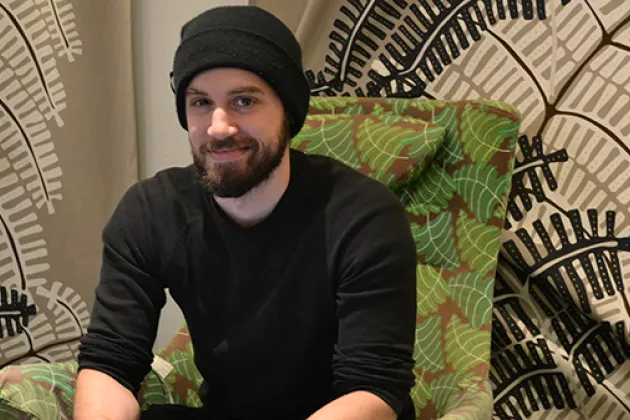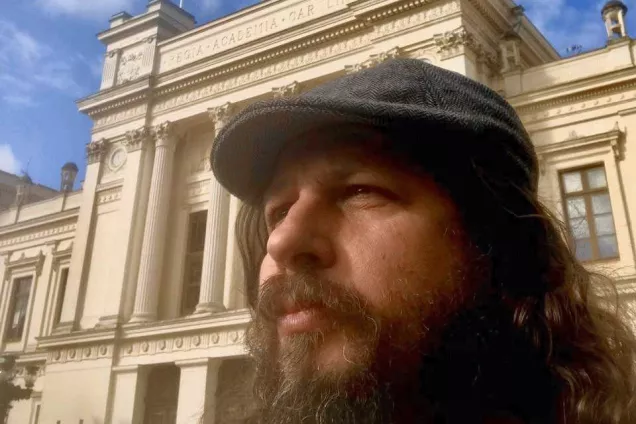What Jesse says about the Master's in Social Anthropology

Jesse Wasson from the USA
How did you find out about Lund University?
“I was a transfer student from a small community junior college to UCLA (University of California) to do my undergraduate in anthropology. While I was there I did a study abroad programme through UCEAP (University of California Education Abroad Programme) to come to Lund for 6 months, and that exposed me to the whole environment here. I took some time off after graduating and then decided I wanted to do my Master’s, and it so happened that they just opened up the Social Anthropology programme to international Master’s students. I applied to that and I got the Global Student Scholarship.”
What made you choose Lund over the other exchange programmes that UCLA had?
“This was because of my area of interest and what I was studying. I took a lot of political science courses to supplement my education and we focused on Scandinavian welfare state societies quite a bit, which is what got me interested in the first place. When I transferred over to UCLA, I initially thought I wanted to minor in Scandinavian Studies, which I ended up not doing. I still took some courses on Scandinavian literature, however, and my interest was solidified in the area. I knew I wanted to study abroad somewhere and Lund was the first place I looked. Lund stood out to me mostly because we had it advertised to us. Former students who did the study abroad talked to us about what it was like. That’s the first time I heard about the nation life and student life in Lund, which was probably the big deciding factor.”
What do you think of the programme so far?
“So far, the experience has been very positive. It’s very small scale – there’s only nine of us, so it’s very intimate. The whole department has been very welcoming and I feel integrated into the academic life as a whole. We’ve had multiple events where you get to meet all the faculty and staff and have fika with them. It’s a very welcoming and inclusive atmosphere, which I never experienced at any other university. One of the first things I heard in the introduction when coming here on exchange was ‘you aren’t just a pupil here, you’re our colleague’. I think that philosophy is reflected in every way that they interact with the students, at least in my experience with this programme so far. The atmosphere and the culture of the programme are very nice. I also enjoy the way the programme is structured; they emphasise group work, group coordination and communication opposed to just sitting and listening to lectures. It’s more active learning versus just evaluations and testing. I feel like I’m getting much more out of it this way.”
What is the main difference is between your programme and your previous education in your home country?
“I think the group orientation and seminar environment that is specifically there for group discussion is the biggest difference. Throughout the methodologies course I got to collaborate with other social sciences students, such as political scientists and sociologists, to create a research proposal. Throughout the entire process we would have seminars to share what we were doing and to critique each other in a constructive way. In the US it was very individual; I only had a few group projects that were limited in scope as well as a few seminars. This idea of group work and communal learning is much more integrated into the system here and that’s what sticks out the most.”
Have you been able to gain any practical experience so far?
“Yes, definitely. We practised setting up a mock research project during the methodology course, which involved gathering our materials, defining what our methodology and theoretical viewpoint was going to be, and then presenting it in a conference. We actually printed out a poster that follows the format that people often use at conferences. We also had an individual project where we wrote a mock research proposal that we would submit as an application for funding. Those are both very applicable skills. Prior in my undergraduate it was almost entirely theoretical.”
Why do you think prospective students should choose the Social Anthropology programme?
“I think it provides a lot of practical skills along with a good foundational theoretical knowledge and learning how to apply it. You also have the opportunity to actually apply it in the field; you can either do an internship or go abroad to do field work somewhere. You can even apply for a scholarship to do that through Minor Field Studies. That’s a really comprehensive experience of field work, I think. Especially if you want to go on to do a PhD, actually having field work under your belt for your thesis is essential. I was accepted into other programmes as well and all the work was in the classroom, without the opportunity to go and do field work. I think field work is necessary in this field, so that’s why I chose this programme and why I think others should as well.”
What’s it like to be an international student at Lund?
“It feels very natural. The city is already very international and the whole system is set up to incorporate international people very well – almost to the point where it’s hard for me to meet Swedish people. I live in an international building and if you go to the nations you’ll meet lots of international students. I of course came to a place that was already familiar, but I never had the feeling of being a total outsider. There is so much in place to integrate people that are coming here, for example the international mentor programme.”
Are there any big differences that you notice being here as a Master’s student versus when you were here as a Bachelor’s student?
“I just utilise my time here differently now. Instead of going out and partying at the nations so much I’m involved in other activities that are more integrated into student life in more productive ways. I’ve for example been attending the UPF lectures quite a bit, which has been really interesting, and I just got started writing on the editorial team for the magazine there as well. I also attend lectures at different departments and am more integrated in that way. That’s a personal choice, however.”
Do you have any favourite places in Lund or the surrounding area?
“I go to Malmö fairly frequently just to explore and shop, as well as Copenhagen. I enjoy hiking and being out in nature, so when it’s warm I make frequent trips to Lomma beach and Soderåsen park to hike.”
Do you have any advice for other students coming from California?
“If you’re coming from California then the weather is very different. Surviving the winter is a real thing, but being proactive about it will make it very easy. The first step is to stay social, and there’s plenty of ways to do that in Lund with all the student organisations and activities. The second thing is to take care of yourself. I got a gym membership at Gerdahallen and they have all sorts of good activities there too. Also make your living space comfortable; go to IKEA and get some homey things. A rug and some candles make all the difference in the world when it’s dark and gloomy out. When the sun does come out, utilise it immediately! My general advice is to hit the ground running and get engaged with all of the student activities that are available because there’s so many!”
Is there anything else you would like to share with prospective students?
“How to interact with Swedish people is something I wasn’t really prepared for. You’re placing yourself in a different culture – just know that just because someone isn’t engaging in conversation with you it doesn’t mean they are being rude. There’s the perception that Swedish people are more reserved, but it’s still easy to make friends, especially if you join organisations and get to know them. It just might be hard to strike up a conversation on the street with someone.”
What do you want to do after you graduate from Lund?
“I’m fairly certain I want to go on to get a PhD.”

Meet our student ambassador Rodrigo
Read his testimonial and chat with him via Unibuddy.